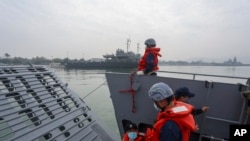Taiwan's Ministry of National Defense is investigating the circumstances surrounding the disappearance of a soldier who was reported missing from his post earlier this month only to be reported found in China by authorities there.
The soldier — identified by Taiwanese SET News as Chen Jiaxun, 26 — was stationed on Erdan islet, part of the Taiwan-controlled Kinmen group of islands. Erdan islet is about 4 km to 5 km from the Chinese port city of Xiamen. The post is considered to be on the front line of defense against an invasion by China, which considers the self-governing island of Taiwan to be its own territory.
Chen did not appear for roll call on March 9 and was not found during a search, according to Major General Zhang Rongshun, director of political affairs, Kinmen Defense Command.
Taiwan’s army command said the coast guard was checking into what happened after local media reported that a "missing soldier surnamed Chen from Kinmen traveled to China due to feelings, debts and other factors."
Taiwan’s Mainland Affairs Council said on March 13 that China had notified Taiwan that Chen was in China. Taiwan’s defense ministry has said that any service member found guilty of defecting will face severe consequences.
The situation is adding to the tense relations between Taiwan and China, which have worsened since then-U.S. House Speaker Nancy Pelosi, a longtime critic of Beijing, visited Taiwan in August and China stepped up its military and political pressure on the island.
According to the official report by the Taiwanese army, Chen’s father said that Chen has debts of roughly $9,800 that he is paying off monthly. Chen worked in the kitchen, according to the report.
Speculation in the Taiwanese press and online suggests the debts may have contributed to Chen’s decision to leave Taiwan. Reports that Chen was found swimming in icy waters by a Chinese coast guard vessel, which responded to a call for help he made on his cellphone, have also raised questions in Taiwan.
Yu Tsung-chi, former dean of the School of Political Warfare at the National Defense University, told VOA Mandarin that if China welcomes a Taiwanese soldier who wants to desert because of debts, it is because it wants to create the impression that Taiwanese soldiers are fragile and cannot fight, especially when compared with Beijing’s official image of the highly trained Chinese military.
Analysts say it is difficult to see the incident as a simple desertion because of Chen's route to China and subsequent reactions from China by authorities, official media, and online comments on its tightly controlled internet.
Chiang Chi-chen, a Kuomintang Party legislator, who once served with Taiwan’s army in Kinmen and is familiar with the local sea conditions, said the recent nighttime water temperature is less than 10 degrees Celsius, making it difficult for ordinary people to swim across the strait.
"If he took a risk like this, it's really outrageous, either there's a plan, or someone is helping him," Chiang said during an inquiry at Taiwan’s legislature on March 14.
The shortest distance across the strait to Chinese-controlled territory is less than 2 km at low tide.
Although Beijing and Chinese state-owned media have remained silent, the Chinese internet celebrity known as Gu Yanmuche posted on Twitter-like Weibo, “Inside news, the (Taiwanese) National Army defector who swam over is checking out houses in Xiamen. The house prices there are 50,000 to 60,000 yuan per square meter, and the house is given to him for free.”
That price is about the average in Beijing or Shanghai, both more desirable locations.
Another Weibo netizen wrote: “I heard that the troops in Kinmen are eager to move [to China] and want to get housing here.”
Although such comments did not come directly from the Chinese authorities, the fact that they were allowed to remain on China’s tightly controlled internet suggests that they are in line with the government’s views.
Chiang said in an interview with VOA Mandarin that the lack of trust and channels of communication between China and Taiwan may turn this incident into a "prolonged cross-strait political game."
And Taiwanese experts worry that the incident could be used by Beijing against the island as cognitive warfare, which refers to the use of information and psychological operations to influence, disrupt, or manipulate the decision-making, perception, and behavior of adversaries or target populations.
Taiwan's Minister of National Defense Chiu Kuo-cheng said during an interview on March 17 that his instinctive reaction is that the Chinese Communist Party is using cognitive warfare and is behind the comments posted online by Chinese netizens.
Adrianna Zhang contributed to this report.





